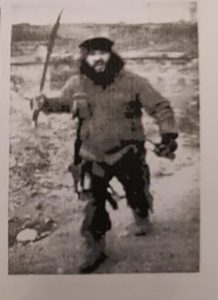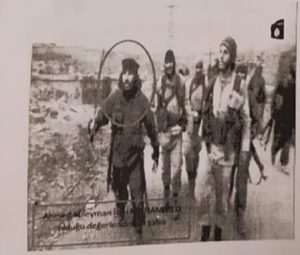Abdullah Bozkurt/Stockholm
A Tajik jihadist who worked with Abu Bakr al-Baghdadi, the late leader of the Islamic State in Iraq and Syria (ISIS), was granted leniency at the sentencing hearing of his trial in Turkey, receiving less than one-third the imprisonment sought by prosecutors.
Ahmad Suleiman Ibn Muhammad, reportedly the right-hand man of Baghdadi, who helped him settle in a safe house in Syria close to the Turkish border, was sentenced to eight years, four months on December 22, 2021, benefiting from a huge reduction in his recommended sentence.
When he was indicted on May 25, 2021 after his arrest on May 2, 2021, the public prosecutor asked the court to convict and send him to prison to serve more than 27 years on multiple counts. Yet the panel of judges who heard the trial disagreed and ruled for a reduced sentence, citing the suspect’s remorse.
The three-judge panel at the Istanbul 24th High Criminal Court allowed Muhammad to benefit from Article 221 of the Turkish Penal Code (TCK), called the “active repentance” law, which reduces or nullifies the prison sentences of suspects who cooperate with investigators and provide information on the group they are charged with being connected to.

It is not clear what information Muhammad provided that was deemed useful as the ruling did not elaborate on that, but it fits a general pattern in the systematic failure of the Turkish criminal justice system when it comes to cracking down on armed jihadist groups. Many ISIS suspects simply go free after brief detentions, and those who are convicted get their sentences overturned on appeal in most cases.
A phone seized during Muhammad’s detention on April 28, 2021 in Istanbul’s Ataşehir district contained dozens of photographs that showed him present during ISIS executions, carrying an automatic rifle and wearing a suicide vest.
A police report dated May 1, 2021 identified him as being involved in clashes and armed conflict. He lost his right eye and right leg when he was wounded in an air raid in 2017 and started using a prosthetic leg. He played a role in the transfer of Baghdadi to a secure location in Syria from Iraq and appeared in violent videos disseminated by ISIS.
A page from the indictment includes photographs that showed Ahmad Suleiman Ibn Muhammad involved in conflict:
In his defense through a translator, Muhammad, an ethnic Tajik who holds Afghan citizenship, testified that he had never had a problem with Turkey and asked for his release, citing the nine children in his care. He admitted he came to Istanbul in 2014 to cross into Syria and join ISIS after establishing contact with a Tajik national identified only as Musab.
He quickly rose in the ranks and was commanding 60 fighters in his unit in 2017. He was subordinate to Abu Saleh al-Iraqi, the ISIS commander in Raqqah. He also admitted that the man holding a sword in his right hand and shouldering a rifle in seized photos was him, although he denied participating in executions.
He said he asked ISIS leadership for permission to leave Syria due to injuries and was allowed to go to Turkey in 2017. He denied having any contact with ISIS afterwards and claimed he has been living a peaceful life since then. His lawyer said his client was not involved in any terrorist plot in Turkey and that there was no evidence suggesting he was one of the leaders of ISIS.

“I helped Turkey out. … I want to stay in Turkey, work here and make myself useful to people and to Turkey. I think I’d be of use if I stayed here. I want to be acquitted,” Muhammad said in wrapping up his testimony.
The indictment accused him of two counts, one for directing an armed terrorist organization for which the prosecutor asked for a maximum of 22 years, six months’ imprisonment, and the other for forgery of official documents, for which he faced up to five years. The judges acquitted him of the passport forgery charge arising from his entry to Turkey on December 31, 2014 on a forged Russian passport under the name of Zarobiddin Kholeov, while reducing the sentence on the terrorism charge to eight years, four months.
Turkish officials do not disclose the number of successful convictions in ISIS cases and decline to respond to parliamentary questions asking for such information. Instead, they often float figures on the number of detentions and arrests, which in many cases result in release and acquittal.
Another page from Ahmad Suleiman Ibn Muhammad’s indictment:
Turkish President Recep Tayyip Erdoğan announced on October 10, 2019 that there were around 5,500 ISIS terrorists in Turkish prisons, of which half were foreign nationals. Yet, on October 25, 2019 Justice Minister Abdülhamit Gül stated at a press conference that there were 1,163 ISIS arrestees and convicts in prison.
Responding to a parliamentary question on July 21, 2020, Gül said 1,195 ISIS members were in prisons either as convicts or suspects in pretrial detention. Of these, 791 were foreign nationals, he added. He declined to say how many had actually been convicted.













